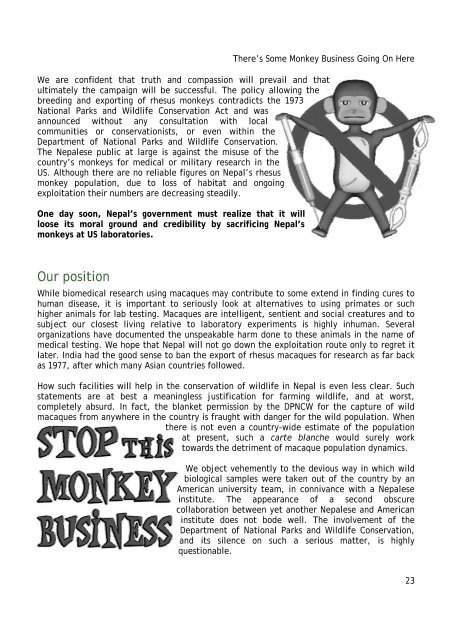Stop Monkey Business Campaign Report - Get a Free Blog
Stop Monkey Business Campaign Report - Get a Free Blog
Stop Monkey Business Campaign Report - Get a Free Blog
You also want an ePaper? Increase the reach of your titles
YUMPU automatically turns print PDFs into web optimized ePapers that Google loves.
There’s Some <strong>Monkey</strong> <strong>Business</strong> Going On Here<br />
We are confident that truth and compassion will prevail and that<br />
ultimately the campaign will be successful. The policy allowing the<br />
breeding and exporting of rhesus monkeys contradicts the 1973<br />
National Parks and Wildlife Conservation Act and was<br />
announced without any consultation with local<br />
communities or conservationists, or even within the<br />
Department of National Parks and Wildlife Conservation.<br />
The Nepalese public at large is against the misuse of the<br />
country’s monkeys for medical or military research in the<br />
US. Although there are no reliable figures on Nepal’s rhesus<br />
monkey population, due to loss of habitat and ongoing<br />
exploitation their numbers are decreasing steadily.<br />
One day soon, Nepal’s government must realize that it will<br />
loose its moral ground and credibility by sacrificing Nepal’s<br />
monkeys at US laboratories.<br />
Our position<br />
While biomedical research using macaques may contribute to some extend in finding cures to<br />
human disease, it is important to seriously look at alternatives to using primates or such<br />
higher animals for lab testing. Macaques are intelligent, sentient and social creatures and to<br />
subject our closest living relative to laboratory experiments is highly inhuman. Several<br />
organizations have documented the unspeakable harm done to these animals in the name of<br />
medical testing. We hope that Nepal will not go down the exploitation route only to regret it<br />
later. India had the good sense to ban the export of rhesus macaques for research as far back<br />
as 1977, after which many Asian countries followed.<br />
How such facilities will help in the conservation of wildlife in Nepal is even less clear. Such<br />
statements are at best a meaningless justification for farming wildlife, and at worst,<br />
completely absurd. In fact, the blanket permission by the DPNCW for the capture of wild<br />
macaques from anywhere in the country is fraught with danger for the wild population. When<br />
there is not even a country-wide estimate of the population<br />
at present, such a carte blanche would surely work<br />
towards the detriment of macaque population dynamics.<br />
We object vehemently to the devious way in which wild<br />
biological samples were taken out of the country by an<br />
American university team, in connivance with a Nepalese<br />
institute. The appearance of a second obscure<br />
collaboration between yet another Nepalese and American<br />
institute does not bode well. The involvement of the<br />
Department of National Parks and Wildlife Conservation,<br />
and its silence on such a serious matter, is highly<br />
questionable.<br />
23


